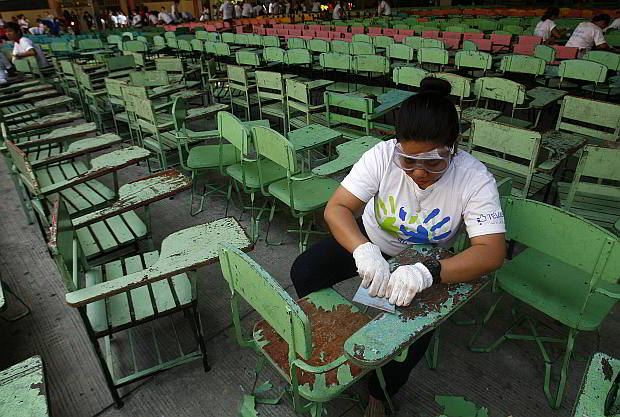The annual Brigada Eskwela (“Brigada”) or the National Schools Maintenance Week starts today until May 24. Education Secretary Armin Luistro calls Brigada as the “longest manifestation of people power in the Philippines.” At least once every year, we see the bayanihan spirit alive and kicking, and not just when disasters strike communities. It is a genuine public-private partnership in action, absent any motive of gain and self-aggrandizement but borne out of altruism and love for our kids and their safety.
Now on its 11th year, Brigada calls for the voluntary participation of parents, teachers, students and the various stakeholders to help ensure that our public schools are spic and span and, most important, safe for our children to go back to when classes open in June. Buildings and facilities are repaired and repainted, with donations for supplies, skills and their time, provided by citizens, foundations and various groups.
This year’s Brigada theme is anchored on making schools and children safe and disaster-ready and resilient, a lesson we still have a lot to learn about even if we are living in a country dubbed as one of the disaster hotspots of the world.
Safety for our school children is Brigada’s prime concern.
It is timely and significant indeed that Ecological Waste Coalition of the Philippines, Inc. (EcoWaste Coalition) and Philippine Association of Paint Manufacturers, Inc. (PAPM) jointly reminded Brigada organizers and volunteers to apply lead-safe work practices as schools are cleaned, repaired or renovated.
Eco-Waste and PAPM said renovation activities, especially those involving repainting, should be done safely to prevent lead paint chips or dust from spreading out.
“The lead dust that may be created as a result of school renovation activities can cause serious health problems for the Brigada Eskwela participants, with the children at highest risk of exposure,” said Henry So, President of PAPM. He adds that “Disturbing a surface previously coated with lead paint by dry sanding or scraping will produce huge amounts of lead-containing dust particles and should be avoided.”
Both groups are active participants of an ad hoc alliance of stakeholders in the Philippines seeking to eradicate lead-added decorative paints, which is part of a seven-country Asian Lead Paint Elimination Project supported by the European Union. They are in the forefront of the ongoing effort to eliminate lead paint in the country in line with the Chemical Control Order for Lead and Lead Compounds issued by the Department of Environment and Natural Resources last December 2013.
Aileen Lucero, coordinator of the EcoWaste Coalition, cautioned parents and teachers that “children may ingest the lead paint chip or dust through normal hand-to-mouth activities as they move, eat and play around the classroom, hallway or school ground.”
“Ingesting or breathing in lead dust has the potential of permanently damaging a child’s developing brain and nervous system, causing learning disabilities and decreased intelligence as measured by IQ scores,” she said, stressing that health authorities have identified “no safe blood lead levels for children.”
Childhood lead exposure is estimated to contribute to about 600,000 new cases of children with intellectual disabilities every year, according to the World Health Organization, which has listed lead as one of the “ten chemicals of major public health concern.”

Volunteers help refurbish arm chairs at the Isabelo Delos Reyes Elementary School, Tondo, Manila as part of the DEPED’s Brigada Eskwela in preparation for the coming school year. (INQUIRER PHOTO)
Towards a lead-safe Brigada Eskwela, the EcoWaste Coalition and the PAPM recommend the following basic precautionary steps for everyone’s safety:
1. Use lead safe paint for school interiors, exteriors, furniture and fixtures.
2. Keep children and pregnant women out of the work area (lead is very hazardous to unborn children).
3. Do not disturb lead-painted surfaces in good condition.
4. Cover cracked or deteriorated surfaces with lead-safe paint. Do not dry sand or dry scrape painted surfaces.
5. Wet sand or wet scrape if desired or needed. Use a spray bottle or wet sponge to keep the surface damp and the airborne dust levels low.
6. Do not eat, drink or smoke in the work area.
7. Work clean: create little dust as possible, clean up thoroughly and dispose of paint waste properly.
8. Thoroughly wash hands with soap and water after any repainting work.
9. After a repainting job, change clothes before going home, set aside used clothes in a sealed reusable bag and wash separately.
Applying lead safe work practices is consistent with the instruction given by the Department of Education regarding the implementation of this year’s Brigada Eskwela tasking school principals to “take the lead role in planning activities to promote a safe school environment.”
Are you now ready for a lead-safe Brigada activity?
Disclaimer: The comments uploaded on this site do not necessarily represent or reflect the views of management and owner of Cebudailynews. We reserve the right to exclude comments that we deem to be inconsistent with our editorial standards.

